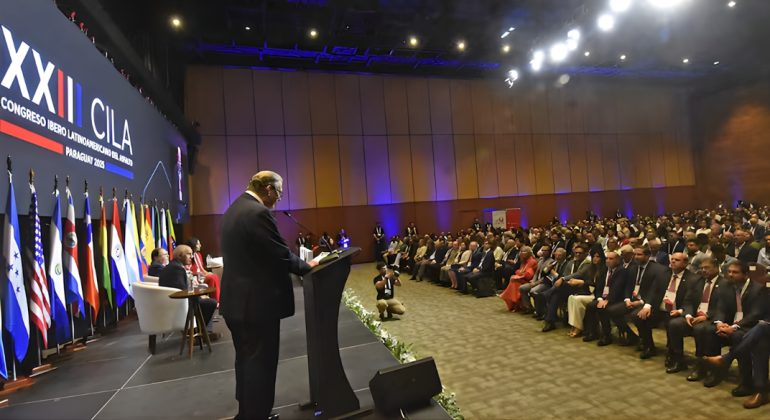Paraguay has opened the eighteenth edition of the Latin American Asphalt Congress (CILA 2025), positioning the country at the forefront of regional debates on artificial intelligence, sustainable materials, and data-driven road engineering. Running from 17 to 21 November 2025, the event brings together more than 1,100 specialists from across the continent to discuss the future of Latin America’s transport infrastructure.
AI and big data lead the agenda
This year’s congress places artificial intelligence at the centre of road management and design. Engineers and researchers are examining how AI can improve the measurement, repair, and long-term resilience of pavements. According to Paraguayan engineer Hugo Sarubbi, the technology is already capable of identifying millimetric deformations in asphalt layers, a level of precision that traditional manual inspections cannot match.
AI calculates the precise resurfacing thickness for each road segment, enabling public works to reduce costs and prevent unnecessary spending. Sarubbi noted that applying six centimetres of asphalt when only three are needed can double the cost of a project, underscoring the financial impact of more accurate digital modelling.
Predictive design reshapes public works
Specialists at CILA 2025 emphasised that artificial intelligence is most powerful when paired with extensive data. Modern systems integrate climate records, vehicle loads, and deterioration patterns to predict how a road will age over time. This predictive approach helps governments plan maintenance early, prevent structural failures, and extend the lifespan of national road networks.
Experts described the shift as a “complete change” in the way infrastructure is conceived, allowing countries such as Paraguay to map risks, prioritise investment, and respond more effectively to environmental pressures.
Sustainable materials gain ground
Beyond digital tools, CILA 2025 highlights new materials that support environmentally responsible construction. Among the leading innovations is Reclaimed Asphalt Pavement (RAP), a technique that reuses layers from old roads. RAP reduces waste, lowers emissions, and cuts the cost of building new stretches of highway. Paraguay is already evaluating the method for future national projects.
A turning point for Paraguay’s infrastructure
The congress arrives at a crucial moment, as Paraguay continues to expand its road network and improve connectivity in rural regions. By combining artificial intelligence, big data, and sustainable engineering, the country seeks safer, more efficient, and climate-resilient infrastructure.
The discussions at CILA 2025 come at a time when Paraguay is actively upgrading its own road network. One example is the ongoing resurfacing of Mariscal López Avenue, where new asphalt paving and phased traffic management reflect the country’s move towards more resilient and modern road design.
As experts gather in Asunción, the overarching message is one of opportunity. Paraguay is positioning itself to adopt global standards in digital engineering, signalling a shift towards infrastructure guided by evidence, precision, and innovation.


